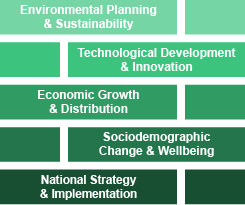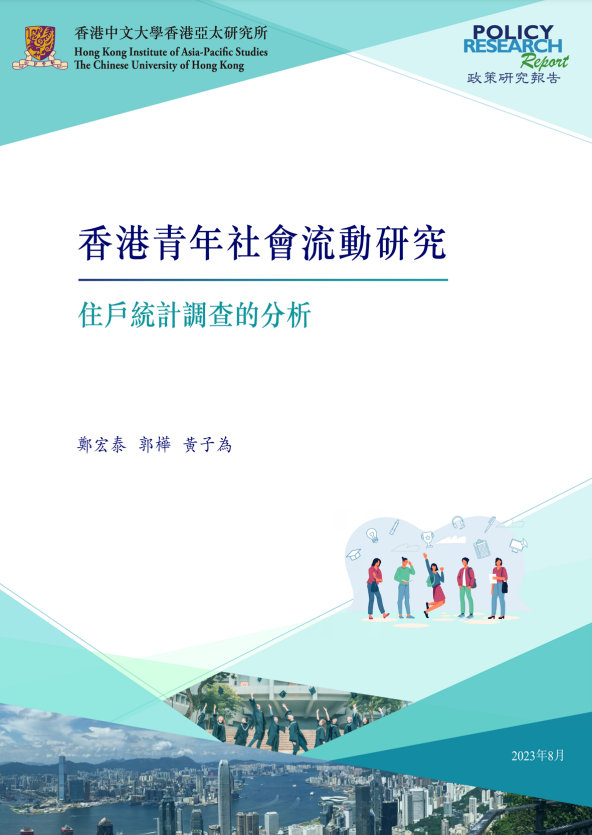
|
| Research | ||||||||
Strategic Research Clusters
 Policy Research @ HKIAPS has identified five closely linked interdisciplinary research clusters to promote academic excellence and social contribution.
Policy Research @ HKIAPS has identified five closely linked interdisciplinary research clusters to promote academic excellence and social contribution.
In the initial phase, we are focusing on research strengths within the Chinese University and on aligning them with the government’s policy priorities and regional development strategies, particularly with the Belt and Road Initiative and the Guangdong-Hong Kong-Macao Greater Bay Area development plan. We will further identify global strategies that are relevant to Hong Kong. ■ |
||||||||
Research Projects * Policy Research @ HKIAPS member
|
||||||||
On Belt and Road Initiative and Greater Bay Area  The Impact of Sino-US Disputes on the Economy of the Guangdong-Hong Kong-Macao Greater Bay Area
The Impact of Sino-US Disputes on the Economy of the Guangdong-Hong Kong-Macao Greater Bay Area by Hongling Guan (PI), & Yun-wing Sung* |
||||||||
On Economic  Hong Kong as International Financial Centre: Challenges and Opportunities
Hong Kong as International Financial Centre: Challenges and Opportunities by Hongling Guan (PI), Yun-wing Sung*, & Terence T. L. Chong |
||||||||
 School Learning Support and Teacher Digital Competence from a Needs Satisfaction Perspective
School Learning Support and Teacher Digital Competence from a Needs Satisfaction Perspective by Thomas K. F. Chiu (PI)*, Garry Falloon, Yanjie Song, & Vincent W. L. Wong |
||||||||
 Research on Student Subgroups from Kindergarten to Secondary School
Research on Student Subgroups from Kindergarten to Secondary School by Kenneth K. Wong, & Dongshu Ou* |
||||||||
On Health  Personalised Health Coaching for Family Caregivers
Personalised Health Coaching for Family Caregivers by Helen Chan*, Benny Zee, Sally Lo, & Fiona Tang |
||||||||
 Assessing and Health Coaching for Cardiometabolic Risk in Middle-aged Group
Assessing and Health Coaching for Cardiometabolic Risk in Middle-aged Group by Helen Chan*, Benny Zee, Sally Lo, & Fiona Tang |
||||||||
 On the Road to Combat the Pandemic: Hong Kong Citizens’ Views on the Impact of and Responses to COVID-19
On the Road to Combat the Pandemic: Hong Kong Citizens’ Views on the Impact of and Responses to COVID-19 by Victor Zheng*, Hua Guo*, & Fanny M. Cheung* |
||||||||
 Implementation of a Family-based Multimedia Educational Programme to Promote the Utilisation of Colorectal Cancer Screening by Older South Asian Ethnic Minorities in Hong Kong
Implementation of a Family-based Multimedia Educational Programme to Promote the Utilisation of Colorectal Cancer Screening by Older South Asian Ethnic Minorities in Hong Kong by Winnie K. W. So* (PI), Dorothy N. S. Chan, Kai-chow Choi, & Carmen W. H. Chan |
||||||||
On Youth  The Social Mobility of Young People in Hong Kong: An Analysis Based on Household Surveys
The Social Mobility of Young People in Hong Kong: An Analysis Based on Household Surveys by Victor W. T. Zheng*, Hua Guo*, & Kevin T. W. Wong |
||||||||
On Belt and Road Initiative and Greater Bay Area
The Impact of Sino-US Disputes on the Economy of the Guangdong-Hong Kong-Macao Greater Bay Area Investigators: Hongling Guan (PI), & Yun-wing Sung* Funding source: Sun Yat-sen University, China  The research team from Sun Yat-Sen University visited Hong Kong from 3 June to 6 June 2019. Two research reports were completed. One of them on the impact of the Hong Kong National Security Law on Hong Kong’s economy received attention from relevant central authorities. The impact of trade disputes on industrial restructuring will be studies in the next phase.
The research team from Sun Yat-Sen University visited Hong Kong from 3 June to 6 June 2019. Two research reports were completed. One of them on the impact of the Hong Kong National Security Law on Hong Kong’s economy received attention from relevant central authorities. The impact of trade disputes on industrial restructuring will be studies in the next phase.
|
||||||||
On Economic
Hong Kong as International Financial Centre: Challenges and Opportunities Investigators: Hongling Guan (PI), Yun-wing Sung*, & Terence T. L. Chong Funding source: Institute of Guangdong, Hong Kong and Macao Development Studies, Sun Yat-sen University, China  The Project covers the longitudinal development of Hong Kong as an IFC (International Financial Centre), and the horizontal comparison of Hong Kong with other major IFC’s in terms of various indicators. The strengths and weaknesses of the major subsectors (stock market, bond market, wealth management, and professional services) are then examined. External challenges (US-China rivalry, Ukrainian war and contractionary monetary policy to fight inflation, Covid epidemic), internal challenges (emigration of talents, exodus of multinationals, and systemic risks), and opportunities (digital currency, fintech, Belt and Road initiative) are analysed in detail.
The Project covers the longitudinal development of Hong Kong as an IFC (International Financial Centre), and the horizontal comparison of Hong Kong with other major IFC’s in terms of various indicators. The strengths and weaknesses of the major subsectors (stock market, bond market, wealth management, and professional services) are then examined. External challenges (US-China rivalry, Ukrainian war and contractionary monetary policy to fight inflation, Covid epidemic), internal challenges (emigration of talents, exodus of multinationals, and systemic risks), and opportunities (digital currency, fintech, Belt and Road initiative) are analysed in detail.
|
||||||||
On Education
Survey on Student Withdrawal from School and Teacher Turnover Investigator: Esther S. C. Ho* Funding source: The Hong Kong Association of the Heads of Secondary Schools Limited  The “Survey on Student Withdrawal from School and Teacher Turnover” is a collaborative research study by the Hong Kong Association of the Heads of Secondary Schools Limited (HKAHSS) and the Hong Kong Centre for International Student Assessment (HKCISA). It aims to:
The “Survey on Student Withdrawal from School and Teacher Turnover” is a collaborative research study by the Hong Kong Association of the Heads of Secondary Schools Limited (HKAHSS) and the Hong Kong Centre for International Student Assessment (HKCISA). It aims to:
|
||||||||
School Learning Support and Teacher Digital Competence from a Needs Satisfaction Perspective Investigator: Thomas K. F. Chiu (PI)*, Garry Falloon, Yanjie Song, & Vincent W. L. Wong Funding source: Hong Kong Research Council – General Research Fund  COVID-19 and emerging technologies have a global impact on the future demand for digital
skills. To thrive in a data- and technology-driven economy, we need digitally competent and
confident teachers to enhance digital skills and competences for the digital age. Therefore,
teacher digital competence (TDC), which is crucial for digital education, should be embedded in
all subjects of teacher professional development.
COVID-19 and emerging technologies have a global impact on the future demand for digital
skills. To thrive in a data- and technology-driven economy, we need digitally competent and
confident teachers to enhance digital skills and competences for the digital age. Therefore,
teacher digital competence (TDC), which is crucial for digital education, should be embedded in
all subjects of teacher professional development.
TDC is a complex concept that includes pedagogy, attitude, efficacy, society and culture, and it has been described in different conceptual frameworks, such as the substitution, augmentation, modification, redefinition framework and the technological pedagogical content knowledge (TPACK) framework. Such frameworks tend to emphasise pedagogy, and technical and procedural skills. Recent studies have advocated encompassing personal and socio-cultural aspects (e.g., ethics, safety and security as well as digital judgement) to broaden TDC. Falloon extended the TPACK framework into a broadly based TDC framework that recognises the increasingly complex knowledge and skills that young students need to function ethically, safely and productively in inclusive, diverse and digitally mediated environments by adding two new sets of competencies – personal-ethical and personal-professional. Implementing the framework should be interdisciplinary and is the responsibility of all school members. However, how to successfully implement the framework in schools remains unclear. In Hong Kong, new policy on TDC that is aligned with Falloon’s (2020) framework will be launched in 2022, and its implementation will face the same challenges. Schools need to model and deliberate professional development activities and policies to motivate in-service teachers to foster TDC development. Teacher motivation can be explained by self-determination theory (SDT), which can provide an understanding of the motivational processes that influence TDC development. Recently, the founders of SDT have called for more studies on how school leadership affects teacher motivation for continuous professional learning. Considering the above, the goals of the proposed project are (i) to investigate the mediating role that fulfilling teachers’ needs may play in the relationship between perceived school learning support and perceived personal-ethical and personal-professional competencies and (ii) to identify effective school policies and continuous professional development activities for TDC. To achieve these goals, this project will propose a research model, implement a sequential explanatory mixed-method study design and collect data via questionnaires, school-based policy documents, professional development activities and individual and focus group interviews. The participants will comprise 300 school teachers from six Hong Kong schools with different levels of academic achievement. The proposed project will have significant impacts (i) on researchers, school leaders and policymakers in the short term by enhancing their understanding of TDC development and proposing an implementation model; (ii) on teacher education programmes and policy in the medium term by adding new TDC; and (iii) on the economy and society as a whole in the long term by improving student digital competence. |
||||||||
Research on Student Subgroups from Kindergarten to Secondary School Investigator: Kenneth K. Wong, & Dongshu Ou* Funding source: Tin Ka Ping Foundation  Prof. Dongshu Ou, Director of Hong Kong Institute of Educational Research, co-organized the Policy Forum on Student Access and School Quality in the Greater Bay Area, China with the Research Consortium of Education Policy and Development on 5 December 2023. The theme of this year was “Student Access and School Quality in the Greater Bay Area, China: Research on Student Subgroups from Kindergarten to Secondary School”. Seventeen academic scholars and educational practitioners from various disciplines were invited to discuss the impacts of schooling opportunity and quality on students, including but not limited to migrant students, low-income students, and students with special needs. Opening speeches were delivered by Prof. Xitao Fan, Dean of Education, Prof. Stephen H. S. Wong, Prof. Kenneth K. Wong, and Prof. Ou, while Prof. Kenneth K. Wong and Prof. Ou also gave concluding remarks. Nine speakers presented their speeches, while discussion was joined by five discussants and moderated by Prof. Kenneth K. Wong, Prof. Ou, Prof. Yan Cao, and Prof. Fan-sing Hung.
Prof. Dongshu Ou, Director of Hong Kong Institute of Educational Research, co-organized the Policy Forum on Student Access and School Quality in the Greater Bay Area, China with the Research Consortium of Education Policy and Development on 5 December 2023. The theme of this year was “Student Access and School Quality in the Greater Bay Area, China: Research on Student Subgroups from Kindergarten to Secondary School”. Seventeen academic scholars and educational practitioners from various disciplines were invited to discuss the impacts of schooling opportunity and quality on students, including but not limited to migrant students, low-income students, and students with special needs. Opening speeches were delivered by Prof. Xitao Fan, Dean of Education, Prof. Stephen H. S. Wong, Prof. Kenneth K. Wong, and Prof. Ou, while Prof. Kenneth K. Wong and Prof. Ou also gave concluding remarks. Nine speakers presented their speeches, while discussion was joined by five discussants and moderated by Prof. Kenneth K. Wong, Prof. Ou, Prof. Yan Cao, and Prof. Fan-sing Hung.
In the first session “International Benchmarks and Student Assessment Approaches”, Prof. Kit-tai Hau and Prof. Yuko Nonoyama-Tarumi challenged the demand for a comprehensive monitoring of education quality and examined socioeconomic status achievement gap in Hong Kong and Macau. The second session “Learning Opportunities for Migrant Children” focused on how different polices enhanced the learning of migrant students in China. Prof. Jialing Han investigated the impact of “Double reduction” policies on the parent-children interaction in Guangdong. Prof. Yun Dai explored the potential of teaching AI literacy to cross-border children in Hong Kong. In the third session “Patterns of Social Mobility: Comparing Native-born and Immigrant Students”, Prof. Yuying Tong studied the role of mother tongue education policy and parental education on children’s advantage in English in Hong Kong over time. Prof. Ou analyzed the intergenerational mobility in education over the last four decades in Hong Kong and compared the case in Guangdong. In the panel discussion session “Leadership Perspectives on Access and Quality in Education”, both Principal Dion Chen and Principal Vincent Kwong discussed the challenges and opportunities faced by Direct Subsidy Scheme and subsidized secondary schools in Hong Kong. Dr Minh Tran explored the advantages and threats of adopting AI to education. About 70 local and regional participants attended the policy forum. For details: https://hkier.cuhk.edu.hk/en/events/policy-forum-on-student-access-and-school-quality-in-he-greater-bay-area-gba-china |
||||||||
On Health
Personalised Health Coaching for Family Caregivers Investigators: Helen Chan* (PI), Benny Zee, Sally Lo, & Fiona Chan Funding source: Private Donation  The goal of this project is to promote wellbeing among family caregivers through primary prevention strategy. The objectives are to identify the cardio-metabolic risk and mental wellbeing of 1,000 family caregivers and to motivate those with identified risk for lifestyle modification and behavioural change through personalised health coaching. This project intends to shift the healthcare focus from cure- to prevention-oriented. This project will help to heighten the community awareness towards cardio-metabolic risks and preventive strategies.
The goal of this project is to promote wellbeing among family caregivers through primary prevention strategy. The objectives are to identify the cardio-metabolic risk and mental wellbeing of 1,000 family caregivers and to motivate those with identified risk for lifestyle modification and behavioural change through personalised health coaching. This project intends to shift the healthcare focus from cure- to prevention-oriented. This project will help to heighten the community awareness towards cardio-metabolic risks and preventive strategies.
|
||||||||
Assessing and Health Coaching for Cardiometabolic Risk in Middle-aged Group Investigators: Helen Chan* (PI), Benny Zee, Sally Lo, & Fiona Chan Funding source: Knowledge Transfer Project Fund, The Chinese University of Hong Kong  The overall aim of this project is to raise public awareness towards cardiometabolic risk factors in middle adulthood. In this project, people with cardiometabolic risk will be motivated to behavioural change through a personalised health coaching intervention. The project experiences will shed light on the local development of primary healthcare policy and services.
The overall aim of this project is to raise public awareness towards cardiometabolic risk factors in middle adulthood. In this project, people with cardiometabolic risk will be motivated to behavioural change through a personalised health coaching intervention. The project experiences will shed light on the local development of primary healthcare policy and services.
|
||||||||
On the Road to Combat the Pandemic: Hong Kong Citizens’ Views on the Impact of and Responses to COVID-19 Investigators: Victor Zheng*, Hua Guo*, & Fanny M. Cheung* Funding source: Policy Research @ HKIAPS  It has been one-and-a-half years since the first case of coronavirus infection was confirmed in Hong Kong in January 2020. There were four waves of outbreak during this period. Although hundreds of infected cases appeared daily at the peak of the third and fourth waves, the epidemic was eventually brought under control. Nonetheless, there is still a risk from imported cases, although the pandemic is less intense than before. At this important moment, it is necessary to conduct comprehensive research to analyse opinion polls and understand the attitudes of citizens towards various disease prevention measures and arrangements implemented by the government.
It has been one-and-a-half years since the first case of coronavirus infection was confirmed in Hong Kong in January 2020. There were four waves of outbreak during this period. Although hundreds of infected cases appeared daily at the peak of the third and fourth waves, the epidemic was eventually brought under control. Nonetheless, there is still a risk from imported cases, although the pandemic is less intense than before. At this important moment, it is necessary to conduct comprehensive research to analyse opinion polls and understand the attitudes of citizens towards various disease prevention measures and arrangements implemented by the government.
Since the start of the pandemic, studies have been conducted from different perspectives to determine how to combat the pandemic, for example, from the perspective of public health, technology, or medicine. However, studies are lacking on how to understand the emergency responses of people in this COVID-19 war. This research is based on data from long-term opinion polls. It includes an in-depth analysis of the COVID-19 pandemic from different aspects in Hong Kong. Directional policy recommendations are also provided to related policymakers and organizations. The research team discovered that citizens demonstrated active and stable responses to the pandemic, but that their vigilance in applying disease protection measures would become less intense as the pandemic eases. Also, individuals hold different views and stances towards the various disease prevention measures and arrangements implemented by the government. However, opinions are more varied on the policies or measures that impose more restrictions on personal freedoms, and these disagreements are also magnified among those in certain age groups and of certain political orientations. In addition, citizens hold an overall negative view of the government’s emergency response to the pandemic. The view on economic prospects and household income is pessimistic as well, more so among those in the non-establishment camp than in the establishment camp. Drawing on the research findings, the research team proposed directional policy recommendations. First, science should take the lead in disease prevention. The government should be sensitive in handling political factors and needs to be aware of the negative impact of announcing new emergency response measures. Second, the impact of the pandemic on different groups may differ. To resuscitate the economy, emergency response measures should focus on those groups that were the most affected by the pandemic. Lastly, promoting the value of “taking the big picture into consideration” and encouraging people to actively take protective measures could lead to more long-term and comprehensive results than hardline measures. These policy recommendations could help the government to understand public opinion and allow them to take it into consideration when implementing disease prevention policies in the future.
|
||||||||
Implementation of A Family-based Multimedia Educational Programme to Promote the Utilisation of Colorectal Cancer Screening By Older South Asian Ethnic Minorities in Hong Kong Investigators: Winnie K. W. So* (PI), Dorothy N. S. Chan, Kai-chow Choi, & Carmen W. H. Chan Funding source: Health Care and Promotion Scheme, Food and Health Bureau, HKSAR Government  Colorectal cancer (CRC) is currently the most prevalent type of cancer in Hong Kong. As CRC screening is recognised as an effective strategy for CRC prevention, its universal utilisation by residents of Hong Kong is crucial for reducing the prevalence of CRC in Hong Kong. Previous studies have reported that South Asian ethnic minorities do not tend to utilise cancer screening services, as they face multiple barriers to do so, such as language barriers, and a limited awareness of the need to undergo regular screening and how to access screening services. Older individuals in this population are more prone to face these barriers, as they are less able to comprehend the health information disseminated by the Hong Kong government. These individuals therefore require linguistically appropriate health educational programmes that increase their knowledge of CRC prevention and screening.
Colorectal cancer (CRC) is currently the most prevalent type of cancer in Hong Kong. As CRC screening is recognised as an effective strategy for CRC prevention, its universal utilisation by residents of Hong Kong is crucial for reducing the prevalence of CRC in Hong Kong. Previous studies have reported that South Asian ethnic minorities do not tend to utilise cancer screening services, as they face multiple barriers to do so, such as language barriers, and a limited awareness of the need to undergo regular screening and how to access screening services. Older individuals in this population are more prone to face these barriers, as they are less able to comprehend the health information disseminated by the Hong Kong government. These individuals therefore require linguistically appropriate health educational programmes that increase their knowledge of CRC prevention and screening.
The aim of this project was to implement a family-based multimedia educational programme that increases the awareness of the importance of CRC screening and promotes the utilisation of CRC screening by South Asian older adults. We recruited South Asian older adults and one of their younger family members to the programme, which was delivered to participants by trained instructors at centres with which we have established collaborations and are operated by non-governmental organisations (NGOs) serving South Asians in the local community. We found that the programme considerably enhanced CRC screening utilisation by older adults, and that a significant proportion of them were able to submit their stool samples for screening on their own, rather than relying on assistance from their younger family members. These observations indicate that the programme effectively increased both the willingness of the older adults to undergo CRC screening and their self-efficacy at submitting their samples for screening. Our findings indicate that our family-based multimedia programme could effectively promote CRC screening utilisation to South Asian ethnic minorities throughout Hong Kong, and to increase their knowledge of CRC prevention and screening. We recommend that the Hong Kong government allocates further resources to enable the implementation of this family-based programme at all NGOs serving South Asians in Hong Kong, to enable this programme to be integrated as part of the support services provided by these NGOs. For example, the government may consider providing funding for the employment and training of programme instructors, to increase the competence and knowledge of these instructors in the delivery of the programme to their community peers. The building of such partnerships with these NGOs may be the key to enhancing the reach of the educational programme to local South Asian communities and the sustainability of its implementation, enabling more South Asians to become aware of the importance of CRC screening and be willing to voluntarily undergo screening. Ultimately, this could reduce both the prevalence of CRC in this underserved population and associated burdens on the health system. |
||||||||
The Social Mobility of Young People in Hong Kong: An Analysis Based on Household Surveys Investigators: Victor W. T. Zheng*, Hua Guo*, & Kevin T. W. Wong Funding source: Policy Research @ HKIAPS  Young people have been the main supporters and participants in the recent social movements and protests in Hong Kong. Many have suggested that the reason for the anger of young people is the insufficient room for development and a lack of opportunities for upward mobility that they might be experiencing. However, there has been a lack of large-scale and reliable empirical research to confirm this. Thus, the purpose of this research is to explore the central concerns of young people in Hong Kong. Have the economic and social changes throughout the years deprived or hindered the upward mobility of young people? Have those changes resulted in injustice for them? Furthermore, the research aims to determine whether the continuous expansion of higher education has brought about the expected societal effects.
Young people have been the main supporters and participants in the recent social movements and protests in Hong Kong. Many have suggested that the reason for the anger of young people is the insufficient room for development and a lack of opportunities for upward mobility that they might be experiencing. However, there has been a lack of large-scale and reliable empirical research to confirm this. Thus, the purpose of this research is to explore the central concerns of young people in Hong Kong. Have the economic and social changes throughout the years deprived or hindered the upward mobility of young people? Have those changes resulted in injustice for them? Furthermore, the research aims to determine whether the continuous expansion of higher education has brought about the expected societal effects.
This research focuses on young and middle-aged individuals in Hong Kong and the analysis is conducted from three aspects. First, educational opportunities, which include access to university education and the role of tertiary education in career development. Second, opportunities in the economy, including job opportunities, chances for upward mobility, and the potential for increased income. Third, subjective social class, which refers to the subjective evaluation of their own social standing by young people in Hong Kong. This research consists of five main themes: 1. The relationship between family and intergenerational social mobility; 2. The relationship between gender and educational opportunities and occupational status; 3. The relationship between tertiary education and youth social mobility; 4. The relationship between elite universities, overseas degrees, and youth social mobility; 5. Social mobility opportunities for immigrants. The data used in this study was obtained from a thematic household survey conducted by the Census and Statistics Department of the HKSAR Government between November 2017 to January 2018. The survey successfully enumerated target respondents in some 10,000 households in accordance with a scientific sampling scheme. This research was supported by the Policy Innovation and Co-ordination Office and the Social Statistics Branch of the Census and Statistics Department of the HKSAR Government.
|
||||||||


